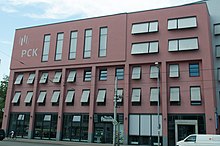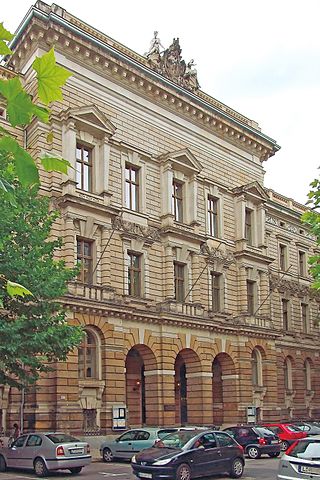
The University of Music and Theatre "Felix Mendelssohn Bartholdy" Leipzig (German: Hochschule für Musik und Theater "Felix Mendelssohn Bartholdy" Leipzig) is a public university in Leipzig (Saxony, Germany). Founded in 1843 by Felix Mendelssohn as the Conservatorium der Musik (Conservatory of Music), it is the oldest university school of music in Germany.
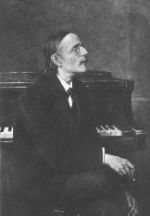
Carl August Peter Cornelius was a German composer, writer about music, poet and translator.

Aribert Reimann is a German composer, pianist and accompanist, known especially for his literary operas. His version of Shakespeare's King Lear, the opera Lear, was written at the suggestion of Dietrich Fischer-Dieskau, who sang the title role. His opera Medea after Grillparzer's play premiered in 2010 at the Vienna State Opera. He was a professor of contemporary Lied in Hamburg and Berlin. In 2011, he was awarded the Ernst von Siemens Music Prize for his life's work.
Nicolaus A. Huber is a German composer.

Dr. Hoch's Konservatorium – Musikakademie was founded in Frankfurt am Main on 22 September 1878. Through the generosity of Frankfurter Joseph Hoch, who bequeathed the Conservatory one million German gold marks in his testament, a school for music and the arts was established for all age groups. Instrumental to the foundation, prosperity and success of the conservatory was its director Joachim Raff who did most of the work including setting the entire curriculum and hiring all its faculty. It has played an important role in the history of music in Frankfurt. Clara Schumann taught piano, as one of distinguished teachers in the late 19th century, gaining international renown for the conservatory. In the 1890s, about 25% of the students came from other countries: 46 were from England and 23 from the United States.
Volker David Kirchner was a German composer and violist. After studies of violin and composition at the Peter Cornelius Conservatory, the Hochschule für Musik Köln and the Hochschule für Musik Detmold, he worked for decades as a violist in the Radio-Sinfonie-Orchester Frankfurt. He was simultaneously the violist in the Kehr Trio founded by his violin teacher Günter Kehr, and a composer of incidental music at the Hessisches Staatstheater Wiesbaden.
Siegfried Mauser is a German pianist, academic and music manager. In 2016, 2017, and 2018, German courts convicted him as a multiple sex offender.

The Frankfurt University of Music and Performing Arts is a state Hochschule for music, theatre and dance in Frankfurt and is the only one of its kind in the Federal State of Hesse. It was founded in 1938.
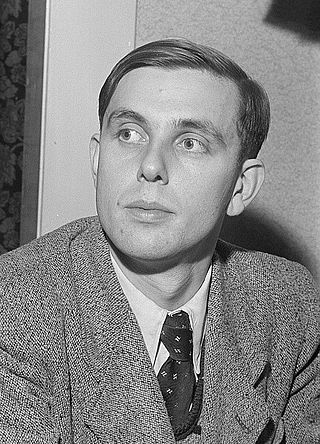
Diethard Hellmann was a German Kantor, composer and academic teacher, first in Leipzig at the Friedenskirche and the Musikhochschule, then from 1955 in Mainz at the Christuskirche and the Peter Cornelius Conservatory, finally in Munich where he was president of the Musikhochschule München from 1981 to 1988. He was known for a weekly Bach cantata in Mainz, broadcast by SWR.
The Hochschule für Musik Mainz is a university of music, part of the Johannes Gutenberg University of Mainz. It is the only such institution in the German state of Rhineland-Palatinate.

Hanover University of Music, Drama and Media is a university of performing arts and media in Hanover, the capital of Lower Saxony, Germany. Dating to 1897, it has reorganised and changed names as it developed over the years, most recently in 2010 when it changed from State College of Music and Drama Hanover. Since 2010, its president has been Susanne Rode-Breymann. As of 2021, the university has 1,484 students and a total of 477 staff.
Martin Galling is a German pianist, harpsichordist and chamber musician.
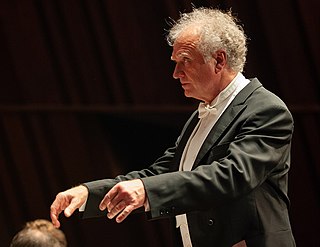
Ralf Otto is a German conductor, especially known as a choral conductor and academic teacher. He founded the Vokalensemble Frankfurt, focused on contemporary music and winning competitions including Let the Peoples Sing. Since 1986, he has been director of the Bachchor Mainz, with a tradition of performing Bach cantatas in broadcast church services. He added late romantic and contemporary works to their repertoire and made international tours with them. They made world premiere recordings of some cantatas by Bach's oldest son, Wilhelm Friedemann Bach, among other recordings. Otto was professor of choral conducting at the Folkwang Hochschule from 1990 to 2006, when he took the same position at the Hochschule für Musik Mainz.
Christian Elsner is a German tenor in opera and concert, and an academic voice teacher at the Hochschule für Musik Karlsruhe. He focused first on lied and oratorio, then entered the opera stage in roles such as Handel's Tabarco and Mozart's Pedrillo. From 2007, he also performed roles such as Wagner's Siegmund and at international opera houses and festivals.
Fred K. Prieberg was a German musicologist. He was a pioneer in the field of history of music and musicians under the Nazi regime.

Christoph Caskel was a German percussionist and teacher.
Günter Kehr was a German violinist, conductor and academic teacher of violin and chamber music. He founded the Kehr Trio, a string trio, and the Mainzer Kammerorchester, a chamber orchestra, and toured internationally with both ensembles. Kehr was director of the Peter Cornelius Conservatory in Mainz from 1953, and professor at the Musikhochschule Köln.
Richard Matthias Jakoby was a German music teacher and cultural manager and until 1993 director of the Hochschule für Musik und Theater Hannover.
Peter Herrmann was a German composer and academic teacher. He composed three operas and a ballet, but mainly instrumental music both for orchestra and chamber music. His works have been performed internationally; his second string quartet was awarded a prize at the Prague Spring International Music Festival. He was professor of composition at the Musikhochschule Leipzig from 1969, serving as its rector from 1984 to 1987.
